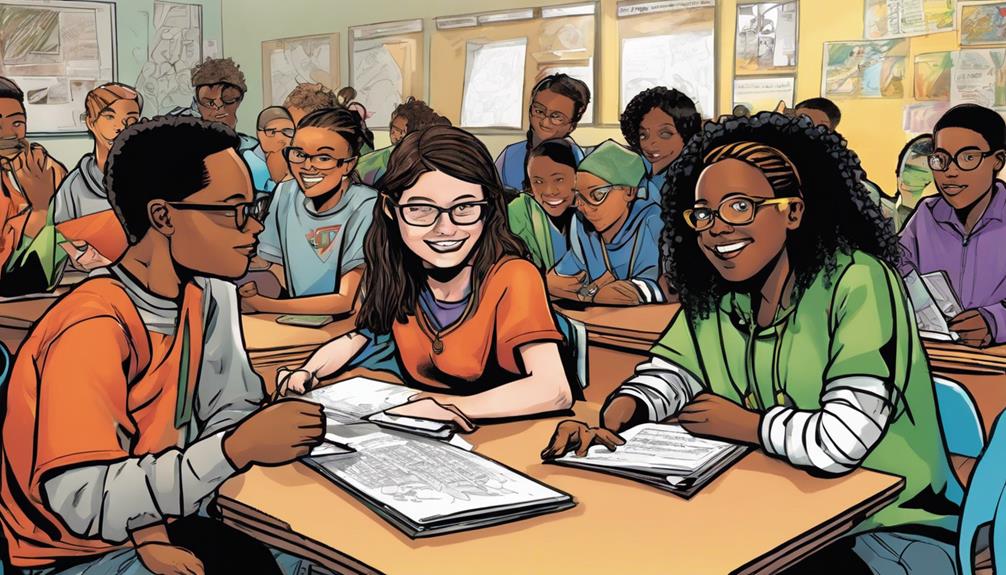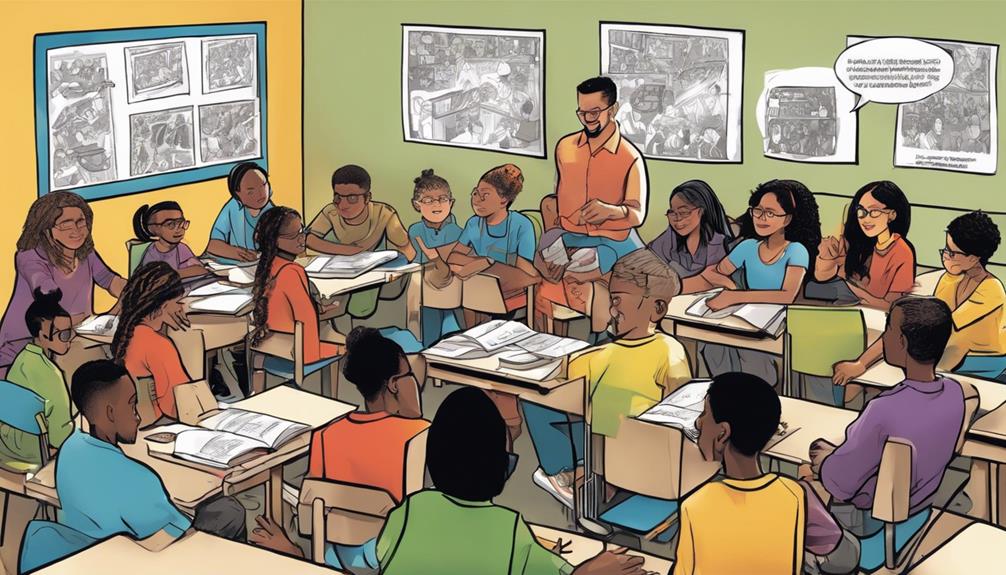Hey there, interested in boosting your classroom engagement? Let’s check out some fantastic collaborative strategies! Have you ever experimented with podcasting? You can unleash your inner storyteller using tools like Audacity. Interactive lesson plans are the way to go – think role-playing, debates, and creative writing workshops. Google Slides, Docs, and Sheets are your go-to tools for real-time teamwork. Spice up your quizzes with Kahoot! and Quizlet. Role-playing not only fosters understanding but also promotes empathy and teamwork. Stay tuned for more thrilling ways to engage your students and enhance the learning experience!
Key Takeaways
- Implement interactive lesson plans like role-playing scenarios to enhance engagement and critical thinking.
- Utilize cloud tools such as Google Docs and Google Slides for real-time collaboration on projects.
- Incorporate engaging quizzes like Kahoot! for interactive and fun assessments.
- Encourage podcasting techniques to foster creativity and storytelling skills.
- Benefit from role-playing activities to develop empathy, teamwork, and communication skills.
Podcasting Techniques
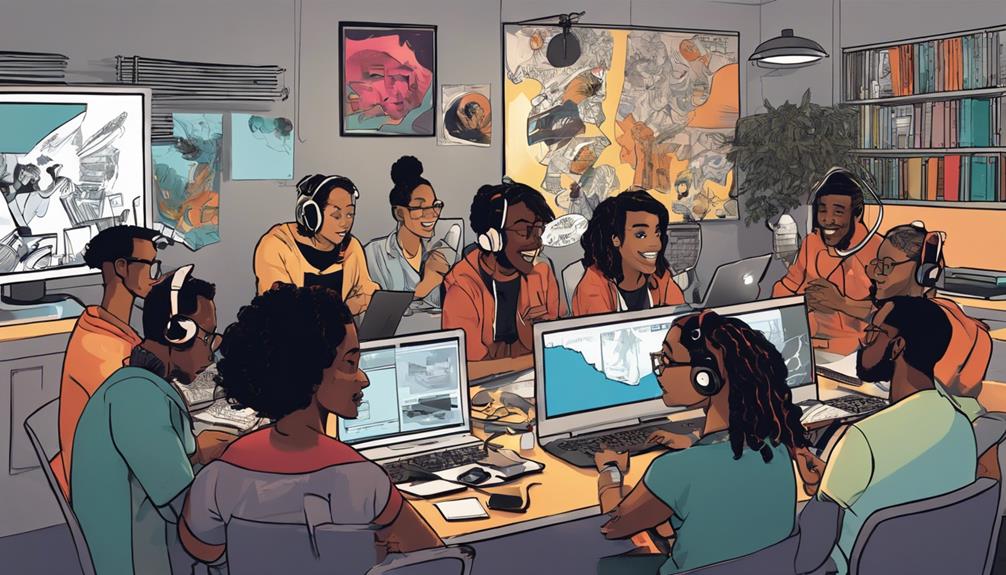
Exploring podcasting techniques enhances student engagement and fosters creativity in collaborative learning environments. By involving students in creating podcasts, you tap into their storytelling abilities and tech-savvy nature.
Recording audio becomes an adventure as they craft narratives, conduct interviews, or share research findings. With tools like Audacity, editing and enhancing audio becomes a breeze. Exporting files as mp3s allows for easy sharing, whether through email, Google Classroom, or even on platforms like YouTube.
Imagine the excitement as students collaborate on scripts, experiment with sound effects, and produce their very own podcasts on topics ranging from history to science to pop culture. Podcasting opens a world of possibilities for students to express themselves and showcase their learning in innovative ways!
Interactive Lesson Plans

Engage students with dynamic and hands-on interactive lesson plans to enhance their learning experience. Interactive lesson plans bring learning to life and make it more engaging.
Here are four exciting ways to incorporate interactive elements into your lessons:
- Immerse in Role-Playing Scenarios: Immerse yourself in historical events, scientific processes, or literary scenes by acting them out. Promote teamwork, critical thinking, and problem-solving skills.
- Engage in Debates: Foster critical thinking through structured team debates. Encourage researching both sides for balanced discussions.
- Tackle Problem-Solving Activities: Develop analytical and decision-making skills with collaborative problem-solving tasks. Reflect on the process for enhanced learning.
- Participate in Creative Writing Workshops: Spark imagination and storytelling skills with peer feedback sessions. Assign prompts to inspire creativity and showcase writing talents.
Utilizing Cloud Tools
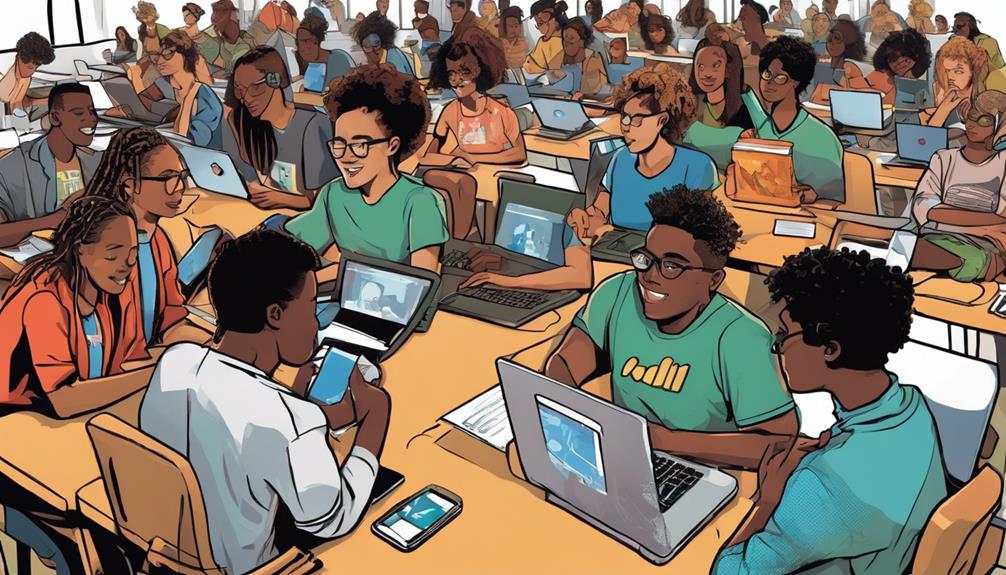
Immerse yourself in Google tools like Slides, Docs, Sheets, Forms, and New Google Sites for collaborative and efficient cloud-based learning experiences.
Google Slides allows you to work on presentations in real-time with your classmates, making group projects a breeze.
With Google Docs, you can collaborate simultaneously on word documents, perfect for group assignments or brainstorming sessions.
Need to collect and process data together? Google Sheets is your go-to tool.
And for surveys or peer-assessment tasks, Google Forms has got you covered.
Plus, New Google Sites offers a user-friendly platform for creating websites to showcase your projects.
These tools not only streamline group work but also foster teamwork and creativity.
Engaging Quizzes
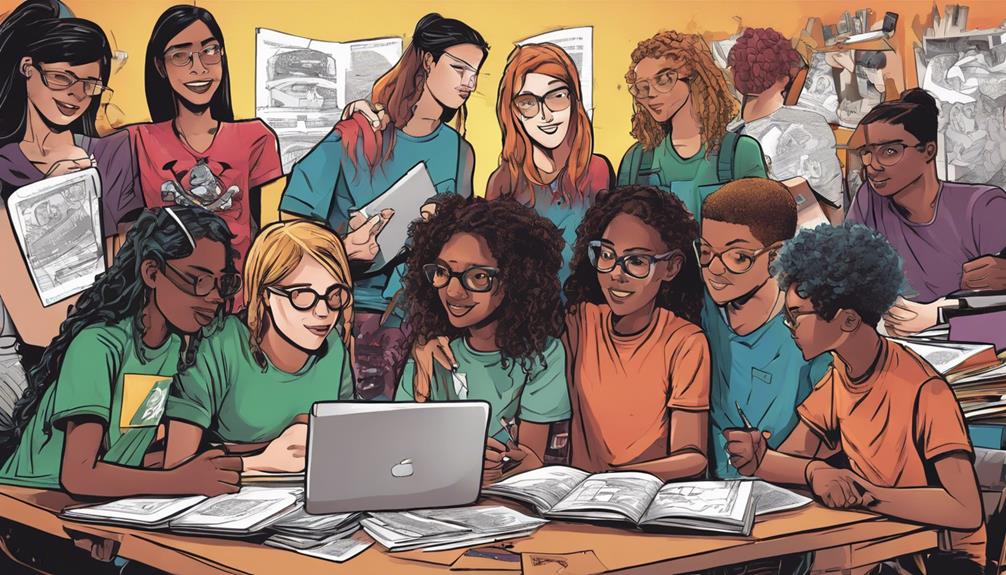
Spice up your classroom with interactive quizzes that challenge and entertain students. Quizzes aren't just about testing knowledge; they can be engaging and fun learning tools. Here are some exciting ways to incorporate quizzes into your teaching:
- Group-Created Quizzes: Let students work together to create quizzes. It's a collaborative and less stressful way to assess learning.
- Kahoot! and Quizlet: Use platforms like Kahoot! and Quizlet for interactive quiz creation. Students can make multiple choice quizzes or virtual flashcards.
- In-Class Presentations: Have students present their quizzes to the class. It boosts confidence and public speaking skills.
- Gamified Learning: Turn quizzes into a game format with rewards or points. It adds a competitive edge and keeps students motivated.
Role-Playing Benefits
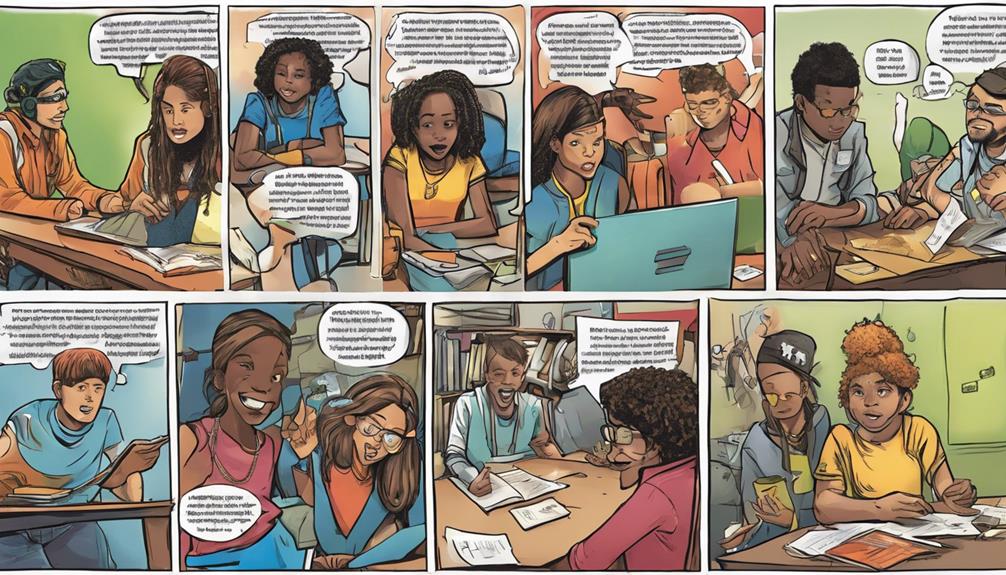
To enhance student engagement and understanding, consider the benefits of incorporating role-playing activities into your classroom. Role-playing offers a dynamic way for students to immerse themselves in various scenarios, fostering empathy, critical thinking, and teamwork. By assigning roles related to historical events, scientific processes, or literary scenes, students can deepen their understanding through hands-on learning. Encourage students to research their roles for a more thorough portrayal and discussion. Here is a table highlighting the key benefits of role-playing:
| Role-Playing Benefits |
|---|
| Enhances Understanding |
| Fosters Empathy |
| Develops Critical Thinking |
| Promotes Teamwork |
| Improves Communication Skills |
Team Research Projects
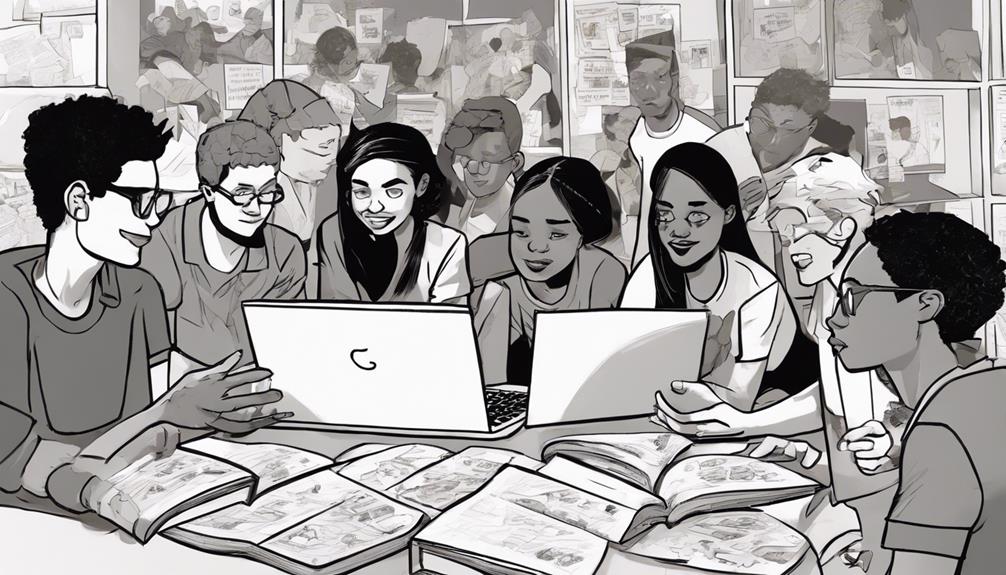
Engage your students in collaborative learning with team research projects that promote teamwork and critical analysis. Research projects are a fantastic way to delve deep into a topic and work together towards a common goal.
Here are some exciting benefits of incorporating team research projects in your classroom:
- Enhanced Teamwork: Assigning specific roles guarantees everyone contributes equally.
- Independent Learning: Students develop critical analysis skills by researching independently.
- Communication Skills: Presenting findings to the class sharpens communication abilities.
- Comprehensive Research: Encourage the use of diverse sources for a well-rounded understanding of the topic.
Team research projects not only foster collaboration but also empower students to become independent learners and effective communicators.
Explore the world of research together for a rewarding learning experience!
Structured Debates
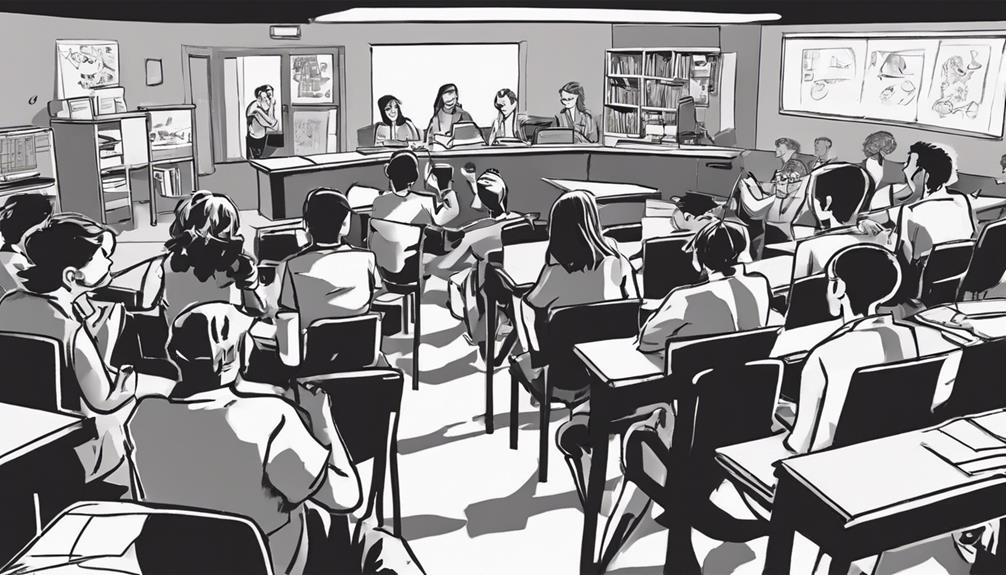
Encouraging students to participate in structured debates fosters critical thinking and enhances argumentation skills. Structured debates provide a platform for students to thoroughly research and present their ideas while respectfully challenging opposing viewpoints. Here's a fun way to visualize the structure of a debate:
| Debate Structure | Description | Benefits |
|---|---|---|
| Opening Statements | Present key arguments | Set the tone for the debate |
| Rebuttals | Challenge opponents | Strengthen critical thinking |
| Cross-Examination | Question opponents | Develops analytical skills |
| Closing Arguments | Summarize key points | Reinforce persuasive skills |
| Audience Questions | Engage with viewers | Enhance communication skills |
Creative Writing Workshops
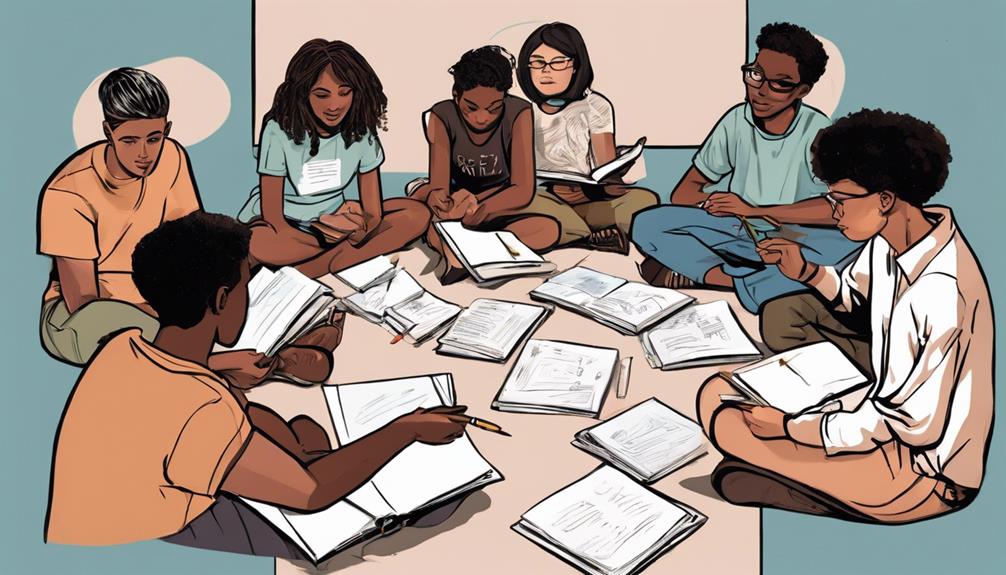
Structured debates are instrumental in honing critical thinking and argumentation skills. Let's now explore the engaging domain of Creative Writing Workshops.
- Encouraging Imagination: Creative writing workshops foster imagination and storytelling skills.
- Sharing and Feedback: Students can share and provide feedback on each other's work, enhancing collaboration.
- Prompts for Creativity: Assigning prompts or themes for writing activities sparks creativity and originality.
- Peer-Editing Sessions: Workshops can include peer-editing sessions for constructive feedback, improving writing skills.
Engage in the world of words, where your creativity knows no bounds! Let your imagination run wild, and together, let's craft stories that captivate and inspire.
Frequently Asked Questions
How Can Students Overcome Stage Fright During Role-Playing Scenarios?
To overcome stage fright during role-playing scenarios, focus on deep breathing, positive self-talk, and practicing beforehand. Visualize success, embrace nerves as excitement, and remember that mistakes are natural. Engage with the role, connect with your character, and enjoy the experience.
What Are the Best Practices for Organizing Collaborative Research Projects?
To organize collaborative research projects effectively, assign clear roles, guarantee equal participation, and encourage thorough research. Present findings to enhance communication. Use diverse sources and structure presentations. Collaborate, analyze, and present together for a successful project outcome.
How Can Teachers Assess Student Engagement During Virtual Field Trips?
Want to gauge student engagement during virtual field trips? Encourage interactive discussions post-trip. Ask for reflections, reactions, or insights. Utilize online tools like surveys or discussion forums to gather feedback. Keep the learning conversation alive!
What Are the Key Considerations for Designing Problem-Solving Activities?
When designing problem-solving activities, consider fostering analytical skills through collaborative brainstorming. Assign roles for effective teamwork and encourage reflection on solutions. Enhance decision-making abilities by tackling real-world scenarios or academic challenges. Promote learning through practical problem-solving tasks.
How Can Students Ensure the Quality of Audio Recordings for Podcasts?
To guarantee quality audio recordings for podcasts, record in a quiet environment, use a good microphone, and check levels before recording. Edit out background noise and adjust volume levels. Export as mp3 for easy sharing.
Conclusion
Now that you've explored the world of diverse collaborative learning strategies, it's time to ignite the spark in your classroom.
From podcasting to role-playing, engaging quizzes to structured debates, the possibilities are endless. Let your students take the lead, spark creativity, and foster teamwork like never before.
Get ready to witness the transformation as your classroom comes alive with interactive and dynamic learning experiences.
So, what're you waiting for? Immerse yourself and watch the magic unfold!

